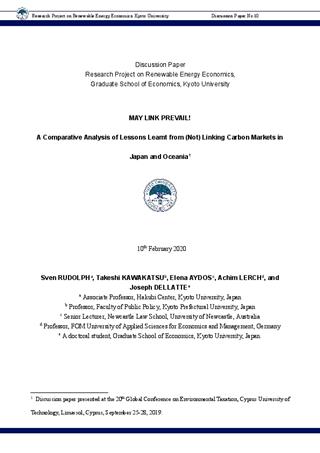TOP > ディスカッションペーパー > No.10 May Link Prevail!
No.10 May Link Prevail!
A Comparative Analysis of Lessons Learnt from (Not) Linking Carbon Markets in Japan and Oceania
February 10th, 2020
Sven Rudolph*, Takeshi Kawakatsu, Elena Aydos, Achim Lerch, and Joseph Dellatte
*Associate Professor, Hakubi Center, Kyoto University
 What makes linking (un)successful? This is the question we would like to address in our GCET20 contribution.
What makes linking (un)successful? This is the question we would like to address in our GCET20 contribution.
The Paris Agreement urgently needs underpinning by ambitious domestic policies. Cost efficient greenhouse gas (GHG) cap-and-trade, or emissions trading, is still a promising tool, particularly with increasing mitigation costs in sight. Traditional economic theory emphasizes that linking domestic schemes even increases efficiency, but linking can also make cap-and-trade schemes more sustainable, as shown in an earlier study presented by the authors at GCET17 in 2016. No least, Art. 6 of the Paris Agreement explicitly allows trading of Internationally Transferred Mitigation Outcomes (ITMO) and thus also opens the door widely for market-to-market linkages. Empirical evidence on linking, however, is limited to some successful cases in North American, Europe, and Japan, while failed attempts include the European Union – Australia and the New Zealand – Australia links.
Against this background we comparatively analyze the successful Tokyo – Saitama and the failed New Zealand – Australia cases. We use Sustainability Economics, Public Choice, and Institutional Economics reasoning in order to evaluate the political process leading to (not) linking, the institutional setting, in which linking did (not) occur, and the consequences of (not) linking. By doing so, we can identify the technical, institutional, and political prerequisites for successful linking as well as respective barriers to linking.
Keywords:Climate policy, sustainability, emissions trading, linking

